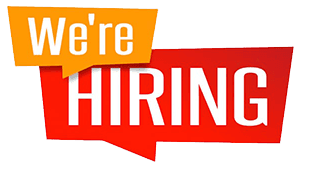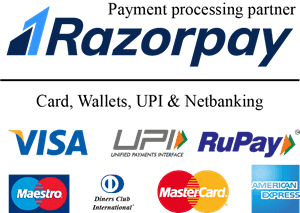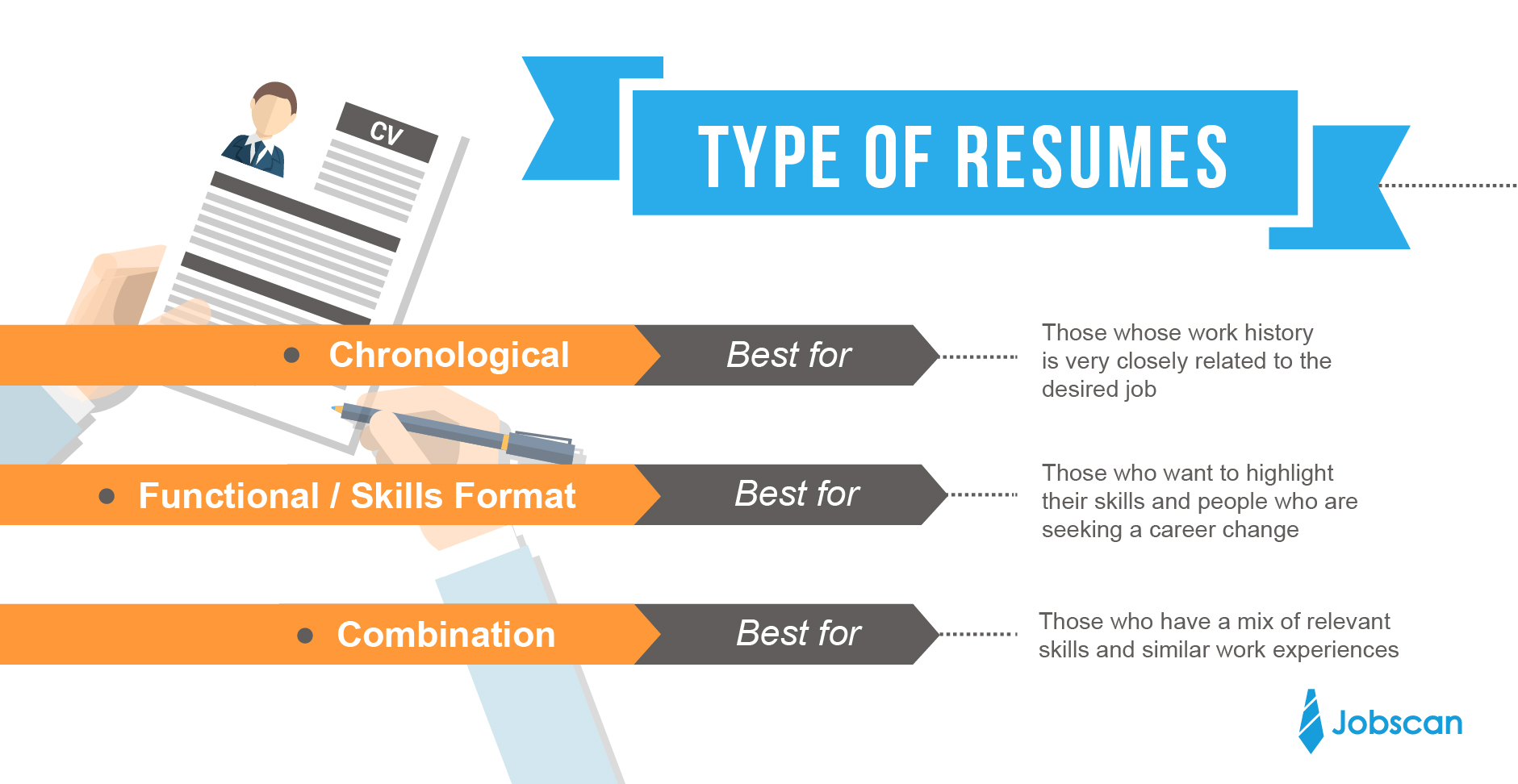WHAT IS A RESUME?
A resume is the representation of your professional self. It is a concise compilation of your educational and professional experience, as well as the skills that make you desirable for the workforce. It is what you use to sell your merit and skills to potential employers.
Your resume is arguable the single most important part of the application process. A well-organized, relevant resume will set you up to get an interview, while a poor resume will get completely lost in the sea of applicants. This is a fairly modern concern, as job postings now get thousands of online applications a day.
WHAT IS THE DIFFERENCE BETWEEN A RESUME AND A CV?
Some companies will indicate that they want you to submit a CV rather than a resume. A CV and a resume are not the same. CV stands for “curriculum vitae” and is meant to be an expansion of your resume. It is much longer than a resume, often three pages or more, and focuses mainly on your academic and professional accomplishments, with a particular focus on education.
In the United States, a CV is almost exclusively limited to professions in academia, science and medicine. In the case of academia, the main focus of the CV should be to identify yourself as a scholar. The added length, should be filled with proof of your skills as a teacher, scholar, and your knowledge of education. A CV should be thought of as a living document, and it will change frequently based on the updates in your education and career.
Generally, a resume is much shorter in length compared to a CV, usually limited to one page. It is meant to be a very brief synopsis of your career and education history. Resumes should focus on measurable accomplishments rather than soft skills or listed responsibilities. Like a CV, resumes need to be updated, but those updates should be made form specific job to which you are applying.
WHAT ABOUT A COVER LETTER?
Including a cover letter can add a lot of value to your application. Just like with a resume, your cover letter should be customized to the job for which you are applying. While it isn’t always necessary to include a cover letter, if you’re given the option, it can only help your chances of getting an interview. Let your personality, accomplishments, and skills come through in a few short paragraphs.
WHAT TO INCLUDE IN YOUR RESUME
The number one tip in our Resume Writing Guide is to keep your resume as clear and to-the-point as possible. While there is no official length limit to your resume, it is meant to showcase only your relevant work experience as fast as possible. The average time spent looking at a resume is 6 seconds, so a concise resume in a one page format is highly preferred. The key word in resume writing is relevant. For example, if an early part of your employment history does not pertain to the job for which you’re applying, and you’re running out of space, don’t include that information. For more information about formatting your resume, see our Resume Formatspage. Your resume also needs these key features:
CONTACT INFORMATION
This might seem obvious, but it is very important. Make sure your resume is updated with your most recent contact information. Recruiters and hiring managers often get thousands of resumes for one job position, so providing them with your email address, personal phone number, and home address will make contacting you for an interview much easier. When including your email address, be sure not to use addresses that are too casual. For example, sarahsmith123@gmail.com is much more appropriate than ilovebieber@gmail.com.
Also be sure to include your city, state or zip code in your contact info, since employers will sometimes search Applicant Tracking Systems with these criteria. It’s also important for ATS to have this information at the top of your page, otherwise it may not be parsed into your candidate profile, making it harder for HR to find or remember your resume.
WORK EXPERIENCE
This section should include all relevant paid work experience, including internships. Volunteer or charity work should not be included in this section, or often at all (see below). Make the title of this section a reflection of your paid experience: “Work Experience”, “Employment History”, and “Work History” are all appropriate titles. This should be listed above “Education” unless you are a recent college graduate, since that information is most pertinent to employers.
Include measurable accomplishments such as “increased revenue by 25%” as well as responsibilities. It is easy to get carried away describing your work experience or responsibilities, but keeping it short is crucial. Once you get an interview, you’ll be expected to go into deeper detail.
For each internship or job, include the name of the organization where you were employed, the city and state, the title of the positions held, the employment period for each job (include both months and years), and a short description of your accomplishments and technical skills used, listed in 3-4 max bullet points.
You should also include information about promotions in this section. When listing your responsibilities, start with the most valuable experience first, since the employer will likely be skimming your resume top-down.
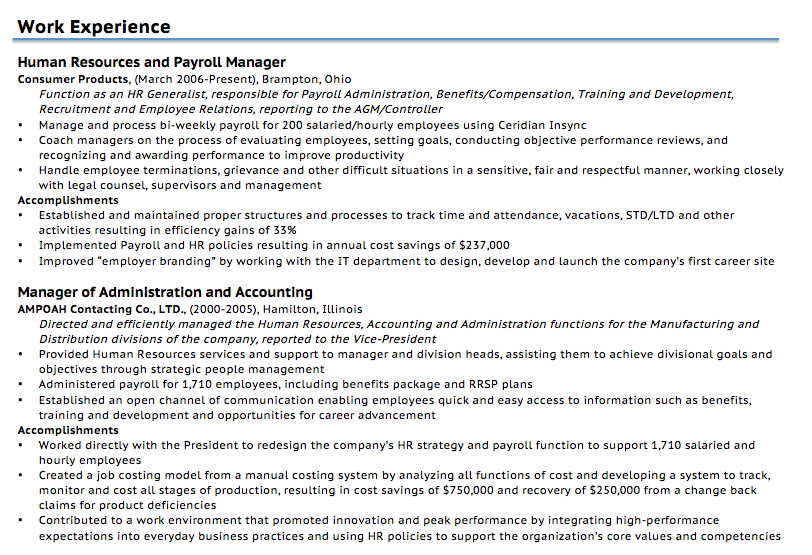
EDUCATION
When providing your education on your resume, list degrees in reverse order. For example, if you have a master’s degree, it should be listed before your bachelor’s degree. Again, if a hiring manager or recruiter is skimming your resume, you want them to see your highest degree first. It is very important to include dates in this section. Furthermore, if you have a bachelor’s degree, it is not necessary to include your high school education on your resume. It is assumed that you graduated high school if you’ve obtained a higher degree. So leave out this information.
Only include your GPA if it is higher than 3.5 on a 4 point scale (no need to mention that 2.0 when you moved into the frat house sophomore year) and only if you are a recent graudate. There are a few exceptions to this rule, like if you’re applying for a job in academia or engineering where a GPA is expected.
You can also list honors or awards if you’re a recent graduate. If you attended college, but did not finish your degree, list the number of credits obtained. For recent graduates, education and internship are your main selling point. But if you’ve already been in the workforce, tone down your education section, the best rule of thumb is that one line will suffice.
SKILLS
The skills in your resume are important when your resume is being submitted through an ATS. ATS stands for “applicant tracking systems”, which are software systems used by 90% of Fortune 500 companies to sort and search applicants. ATS sort and rank applicants using keywords specific to the job description. Use skills in your resume as a hub for keywords specific to the job for which you’re applying. Your resume should be tailored to each job you apply to so the skills should be integrated organically in your work experience if possible.
Jobscan helps you determine which keywords will help your resume make it through ATS by comparing the job posting with your resume. You can try your resume below.

If necessary, you may want to include a skills section. These portions of your resume are especially well-suited to technical positions. Hard skills are provable, experience-based skills, which are the only type you should include in this section. Examples include computer programing, WordPress, Spanish fluency, heavy machinery operation and HTML. Also include a description of the skill, or your expertise level is possible.

AWARDS AND ACCOLADES/AFFILIATIONS
Only include this section if it makes sense for the job for which you’re applying. If you’ve received relevant awards or have affiliations that the recruiter or hiring manager would like to know about, feel free to list them. Steer clear of listing affiliations that are not relevant and potentially polarizing, such as political or religious affiliations.
COMMUNITY SERVICE
This is another resume section that is a judgment call. If you’re applying for a leadership or management, or for a job with a non-profit company, your community service experience is worth listing. Always think of relevance before adding anything to your resume. For example, if you are applying for a job in marketing and have volunteer experience in social media, that’s great information to add. If you are applying for that same job in marketing and volunteered in a food kitchen, there’s no need to include it in your resume. You can always talk about your passions and volunteer experience when you’re in an interview
WHAT TO LEAVE OFF YOUR RESUME
OBJECTIVE STATEMENT
The objective statement is somewhat antiquated since online applications have evolved. Unless you’re sure that your resume is going directly into the hands of the hiring manager or recruiter, an objective statement is not necessary. If you like the idea of an objective statement, consider adding a professional summary statement instead. While an objective statement explains what you hope to accomplish, a summary statement explains who you are and what you have already accomplished. It also positions you to be desirable to the company, rather than seeming like your’re only looking out for what YOU want.
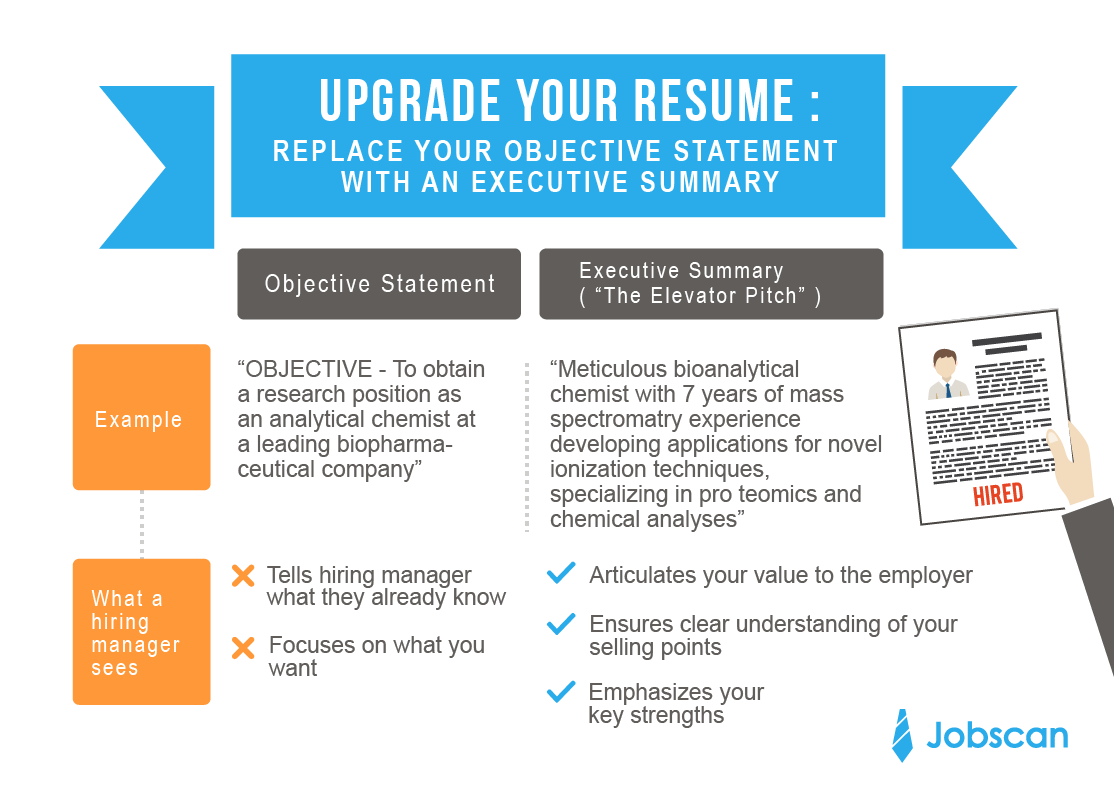
REFERENCES
It is assumed that you have references if you have previous employment history. It is not at all necessary to include “references available upon request”, adding this is actually a potential deterrent. Potential employers will ask you for your references later on in the interview process if they see fit. Of course, if references are asked for within the application process, provide them – just not on your resume
SOFT SKILLS
Soft skills are any skills that are not provable or quantifiable. If Sarah Smith says she is “hardworking”, “problem solving”, has a “strong work ethic”, and “positive attitude”, the recruiter has no way of knowing whether or not that is true. Use hard skills and prove your soft skills by listing your previous accomplishments and promotions on your resume.
GPA
As mentioned above, your GPA is only necessary if you are a recent college graduate and do not have work experience to back you up. There are a few jobs that require a GPA, however, including engineering and finance.
USE KEYWORDS TO TAILOR YOUR RESUME
One of the biggest mistakes you can make when applying to jobs is sending the same generic resume out for each one. Sure, you can apply to more jobs if you don’t take the time to personalize your resume each time, but chances are you won’t get interviews from any of them. If you take the time to tailor your resume, even though you’ll be applying for fewer jobs, you’ll get more interviews.
Applicant Tracking Systems use keywords to search through thousands of resumes. Think of ATS as a search engine. You want to optimize your resume so it shows up at the top of the search. Hiring managers and recruiters can type in a keyword and get a ranking of the top applicants. Reading the job posting carefully and using relevant keywords is crucial to getting through ATS.
Our friend, Sarah Smith, might want to include keywords like “digital marketing”, “SEO”, and “Google Analytics” in her resume.
Jobscan helps you identify the keywords you should use in your resume by comparing the resume against the job posting. You will get a match rating (80% or higher is ideal) and tips on how to raise your rating.
COVERING GAPS IN EMPLOYMENT
If you have major gaps in employment, there are a few ways to make them less noticeable like a change of resume foramt. It is important to be honest about gaps in your resume and not try to cover them up, but to also make them seem productive and intentional. Adding volunteer work or classes in the time you were unemployed is highly valuable and fairly simple to get starter with.
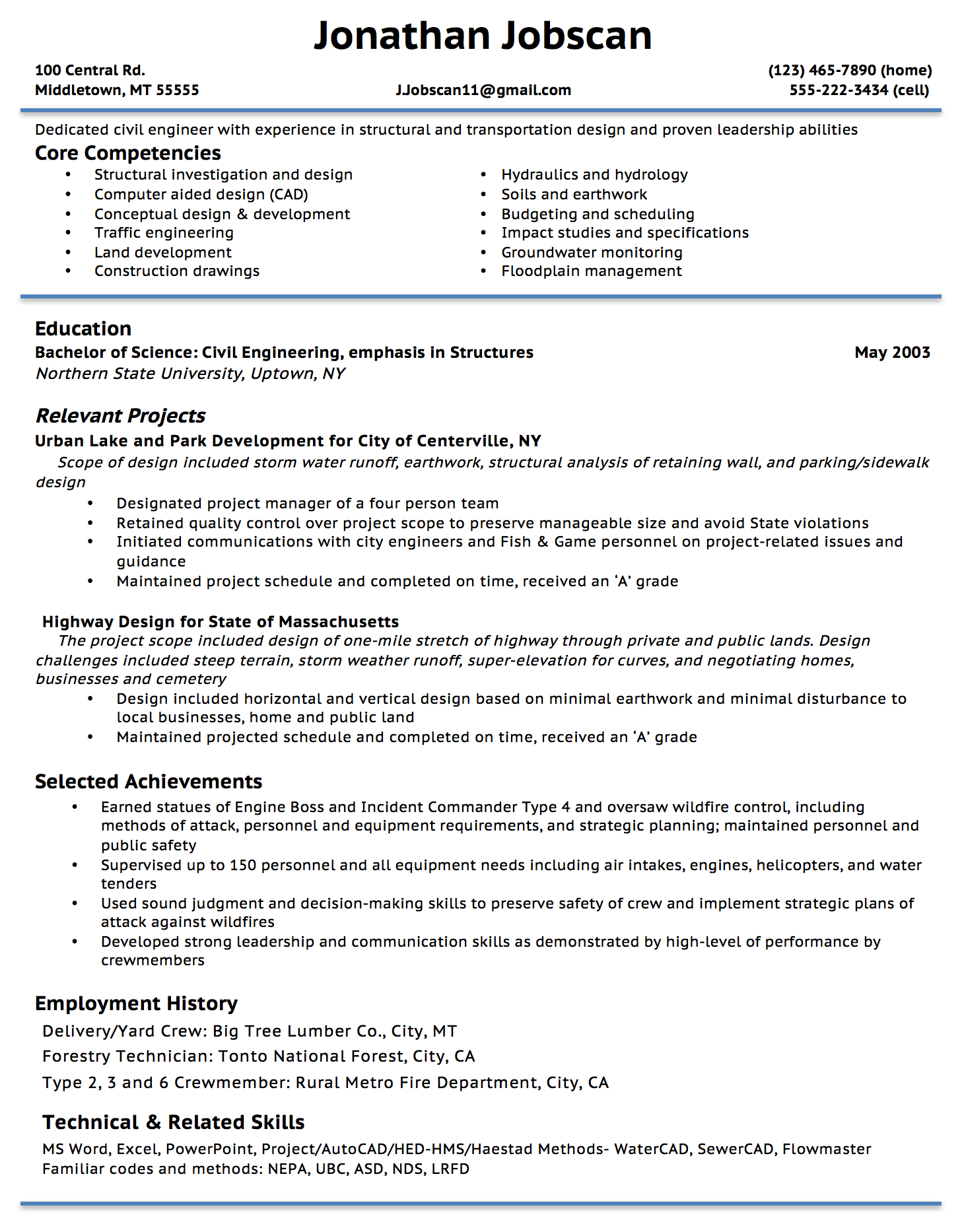
Example of a functional resume format
Using a functional resume format is beneficial when you have gaps in employment. The functional resume highlights honors and achievements more than work experience. It lists your skills and other attributes that make you a good employee at the top of the resume.
It is important to fill the gaps in employment with experiences that helped you grow. Volunteer work, continuing education, and other projects you worked on during that time are all great options. Be sure to use a positive tone while describing the gaps in employment and be confident about them when interviewing later.










